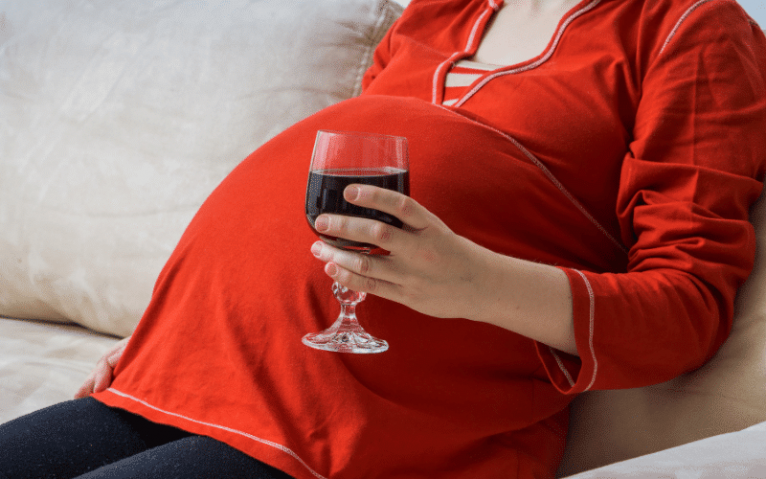To some, the idea of drinking while pregnant is impossible. However, many women believe this might not be as dangerous as we’re told. Moreover, many women struggle with alcohol use disorder when pregnant, which adds another layer of complexity to the issue. After all, for these women, it isn’t about the occasional drink. They may engage in binge drinking episodes that can be significantly dangerous for her and the baby.
The History of Not Drinking While Pregnant
For decades, pregnant women receive a long list of medical recommendations that can sometimes come across as patriarchal don’ts. Stay away from raw fish, don’t consume deli meats, don’t do this, don’t do that, — don’t drink.
There’s scientific evidence that shows these activities can have adverse effects on the fetus, but the one that’s always in the constant debate is alcohol. After all, most of our mothers did it back in the 1960s or earlier, didn’t they?
It wasn’t until 1973 when fetal alcohol syndrome (FAS) was formally recognized after a seminal article was published in a medical journal. The article’s findings included changes in growth, distinctive facial features, and negative impacts on the developing brain, meaning alcohol caused these birth defects.
After that, in 1988, Congress passed the Alcohol Beverage Labeling Act, which eventually added the well-known disclaimer that states, “women should not drink alcoholic beverages during pregnancy because of the risk of congenital disabilities.” The act also added a warning about drinking and driving.
However, many saw this as an opportunity to over-police pregnant women in public. Nonetheless, since then, women have become more vocal about patriarchal messaging in medicine. Was no-drinking-while-pregnant another way to speak down to women and control them? No, it was not. But confusion is expected.
Why Drinking While Pregnant is Dangerous
Women often play down the dangers of drinking during pregnancy because giving alcohol to pregnant women for medical testing is not likely to be happening any time soon.
What we do know is that alcohol passes to the baby through the umbilical cord. Nowadays, we know that alcohol’s effects can cause miscarriage, stillbirth, and a range of lifelong physical and behavioral disabilities. Today, those disabilities are known as fetal alcohol spectrum disorders (FASDs), and they include:
- Abnormal facial features
- Smaller head size
- shorter-than-average height
- Low body weight
- Poor coordination
- Hyperactive behavior
- Poor memory
- Learning disabilities
- Speech and language delays
- Intellectual disabilities
- Poor reasoning and judgment skills
- Sleep and sucking problems as an infant
- Vision or hearing problems
- Heart, kidney, or bones problems
Statistics Around Drinking Alcohol During Pregnancy
Some women wonder if drinking wine while pregnant is safe; after all, French women do this, don’t they? It appears that this is another myth. One study in Europe found that only 11.5 percent of women reported consuming alcohol while pregnant. Of these women, 72% had a single five-ounce glass of wine or less during the entire pregnancy.
While the occasional drink in early pregnancy is common, obstetricians and gynecologists encourage women to avoid alcohol once they know they’re pregnant. Even the Centers for Disease Control and Prevention (CDC) states that there isn’t a known safe amount of alcohol to drink while pregnant.
However, the effects of drinking while pregnant are more studied nowadays. For example, in the United States, we have data that proves the rates of fetal alcohol spectrum disorders are higher than we believed. In 2018, one paper published in a medical journal evaluated over 3,000 children across the US.
The findings were staggering. The rate we’re consuming alcohol in pregnancy results in a conservative 1.1 to 5 percent of children (up to 1 in 20) with FASDs, making these disorders more prevalent than autism. Yet, at least 10 percent of pregnant women still drink during pregnancy.
How to Stop Drinking Alcohol During Pregnancy
For some women, ditching alcohol during pregnancy is uncomplicated. However, for those with a substance use disorder, this can be quite the challenge. Alcohol is part of most of our social activities. Not to mention, you’re likely to crave a drink as you’re dealing with the anxiety, pressure, and stressors of pregnancy. Here are something you can do to help you stay away from alcohol:
- Bring non-alcoholic beverages to social events or occasions when you usually drink alcohol
- Avoid situations where your drinking habits can be triggered, like parties or bars
- Get rid of all alcohol in your home
- Tell your partner, friends, and family that you’re looking to practice abstinence during pregnancy and ask for their support
- Practice mindfulness and relaxation techniques to help you control your cravings better
Be Open to Seek Help
There’s no minimum amount of alcohol that’s considered safe while pregnant. Unfortunately, when it comes to caring for yourself and your baby, alcohol must stay off the table. If you find yourself struggling with alcoholism, consider talking to your healthcare provider about alcohol addiction treatment programs.
Don’t let the stigma linked to seeking addiction help while pregnant prevent you from seeking treatment. It’s paramount that you ask for help from professionals who can help you make sure you and your baby will stay safe and healthy throughout the pregnancy.
At Lighthouse Recovery Institute, we offer specialized treatment programs for pregnant women struggling with substance abuse. We understand that your needs are very different from others, and we customize our treatment programs to address your unique needs.
We know it can be scary to start rehab while pregnant, but this might be the best opportunity you have to regain control of your life and get sober. Even if you’re not ready to seek addiction treatment, we encourage you to attend an Alcoholics Anonymous support group meeting near you to start the healing process. Whenever you’re ready, we’ll be here waiting with open arms.





